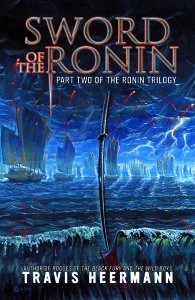 A guest post by Travis Heermann.
A guest post by Travis Heermann.
Writers are some of the most desperate people on this planet.
We pour our poor, tender subconscious out into an endless void, where most of the time nothing comes back to us but endless rejection. Except for Mom, who loves our stuff. The writer’s life is a long, lonely road through a thunderstorm, the aloof gaze of a bazillion passing headlights washing over you in the pouring rain as you drag your luggage behind you, which contains your most precious things–your dreams, your stories, your underwear. And all you want is someone to notice you, pull over and give you a ride, someone besides your mom, someone in the industry who’ll drive you to that cocktail party where the real authors hang out. Many of us walk this road for years, and it breeds a kind of desperation akin only to that experienced by would-be starlets bound for Hollywood, suicidal painters, and musicians living in their van.
On the advice of several people, I attended my first World Science Fiction Convention in 2008 to stick out my thumb and hope for a ride.
I was there with singular purpose: meet editors and pitch my next novel. But the hard part was, I knew practically no one there. There was an acquaintance I had from back home, a fellow writer, and he was literally the only person I knew. As most writers are introverts for whom assertiveness and social intricacies are secondary skills–that’s why we write, for frak’s sake–this kind of situation is a like a death-trap designed by our arch-nemesis.
I could not help but walk around just agog, thinking “Oh, my god! There’s Favorite Writer X.” Such people were thick on the ground, writers I had been reading for years. If Heinlein (were still alive) and Bradbury had been there, I would have collapsed into a puddle of nerveless protean goo.
When one is walking around an event like this, a world of incredible conversations spin about us. It is not uncommon to see four or five established, A-list authors just sitting around chatting. The newbie can only imagine what spectacular deals and secret insider news they must be discussing, what great mind-blowing works they’re forging next, and then one is stabbed by that dagger of silent desperation to be in that circle. And then one stands there, perhaps twenty feet away from the august gathering, mooning like a stalker, until finally sighing and shuffling off, all but drowning in the soul-crushing certainty that one will be an utter nobody forever.
At conventions like World Con and World Fantasy, the two principal cons for professional networking, the air is redolent with the scent of Desperate Newbie Writer, an aroma unique and distinguishable from Unshowered Fan or Get-Me-The-Frak-Out-Of-This-Rubber-Costume-I’ve-Been-Wearing-In-95-Degree-Heat-For-Six-Hours. Many of these desperate newbie writers–and having been one for many years allows me to spot them in a crowd–brim with the same purpose as I had. Meet that editor. Meet that agent. Meet that publisher. Why? To break in! To enlist the aid, or at least snare the momentary attention, of one of those revered, overworked gatekeepers.
Given the speed at which publishing works, and the infrequency and cost of conventions like these, the newbie’s mistake is thinking that anything is going happen within the lifespan of a Galapagos tortoise. Yes, lightning does strike, but would you really want to expect your career to be built on one lightning strike? Ain’t gonna happen, get over it.
But here’s what does happen.
At that first World Con, my friend from back home introduced me to some people, who introduced me to others. I met a few other people who were further down the path that I was. In the five years since, as I attended other cons like World Fantasy, and this year for the first time, Dragon Con, those initial acquaintances have become friends and mentors, and as my social network has grown, so has the potential for professional development. Let us not fail to mention that the respect and camaraderie of one’s peers feels pretty good to a writer’s soul worn ragged by screaming into the echoless void. I should also not fail to mention that I have built up my publishing history with a few more novels and some short stories.
At about this time, I had also launched an Author Interview Series for my blog, which I had conceived as a way to not only build traffic, but also to network with writers I admired. So I had a secondary purpose: to secure contacts for interviewees. Most authors are hungry for exposure, so I found most of the people I spoke to receptive to an interview. I came home with an armload of interviews, and months’ worth of blog content. And because I had asked questions that were not run-of-the-mill fan questions, questions that attempted to get at the heart of how one became a career author, which is what truly interested me anyway, they remembered me. The Author Interview Series became a form of networking.
Here’s the disheartening truth: you will never be part of that circle you so desperately wanted to join, not even if you do break in and build a fabulous career. Because those circles are made up mostly of friends who have known each other for years, and often came up through the weeds from Newbie Land together.
Now here’s the encouraging truth: if you keep at it, if you write, if you sell, if you persist, you will eventually be part of your own circle of long-time friends sitting around at cons, talking shop, bitching, gossiping, all the things that professionals do at professional events.
And you know what? Trusting that this will happen is enormously liberating; it removes all that pressure, assuages all that desperation, blunts the edges of that longing to be “one of the pros.”
So here’s what you need to create your own circles of professional friends, acquaintances, and contacts.
- Basic social skills. Most people, especially other writers, recognize that writers are themselves eccentric folk, so they’ll likely forgive a rookie gaff or two. But the better you are with people, the more confident you are with yourself and your work (and oh, isn’t this the tricky one!), the faster your network of acquaintances will grow. If you’re going to World Fantasy, imagine a four-day cocktail party, and prepare yourself for it. Study social dynamics if you have to.
- Street Cred. That’s right. You have to write, and keep writing. Eventually, you will pick up some sales. People will start to notice. People will remember you from conventions (hopefully positively), and it will get easier and easier.
- Patience. We all know how long it takes to build a real writing career. If you’re in this demanding overnight success, quit now. Go away. You’re deluded. I used to envision Harlan Ellison and Ray Bradbury toiling away at the typewriter, struggling but getting by on the money they made from their short stories. I saw an interview with Ray Bradbury wherein he described how it him about seven years to make any kind of appreciable income from his fiction writing efforts after he sold his first story. Along the course of your career, there will be likely a few big leaps, but mostly it consists of thousands of meandering baby steps.
Now, there are still a lot of people who are further down the path than me. They always will be. But I can also look back and see that there are many, many people behind. Some will give up and turn back. Some will get lost in the Swamp of Despair, or take a wrong turn into the Valley of Evil Counselors. I have come a long way since that first World Con. I can go to major conventions now, guaranteed to know people there. My circle of professional friends and contacts continues to expand.
So relax. Take heart. Your network will grow like a tree that has taken root, and fruit will eventually start to appear on some of the branches.
 Freelance writer, novelist, award-winning screenwriter, poker player, poet, biker, roustabout, Travis Heermann is a graduate of the Odyssey Writing Workshop and the author of the Ronin Trilogy, The Wild Boys, and Rogues of the Black Fury, plus short fiction pieces in anthologies and magazines such as Weird Tales, Historical Lovecraft, and Shivers VII. As a freelance writer, he has produced a metric ton of role-playing game work both in print and online, including Legend of Five Rings, d20 System, and the MMORPG, EVE Online. He enjoys cycling, martial arts, torturing young minds with otherworldly ideas, and zombies. He has three long-cherished dreams: a produced screenplay, a NYT best-seller, and a seat in the World Series of Poker.
Freelance writer, novelist, award-winning screenwriter, poker player, poet, biker, roustabout, Travis Heermann is a graduate of the Odyssey Writing Workshop and the author of the Ronin Trilogy, The Wild Boys, and Rogues of the Black Fury, plus short fiction pieces in anthologies and magazines such as Weird Tales, Historical Lovecraft, and Shivers VII. As a freelance writer, he has produced a metric ton of role-playing game work both in print and online, including Legend of Five Rings, d20 System, and the MMORPG, EVE Online. He enjoys cycling, martial arts, torturing young minds with otherworldly ideas, and zombies. He has three long-cherished dreams: a produced screenplay, a NYT best-seller, and a seat in the World Series of Poker.




